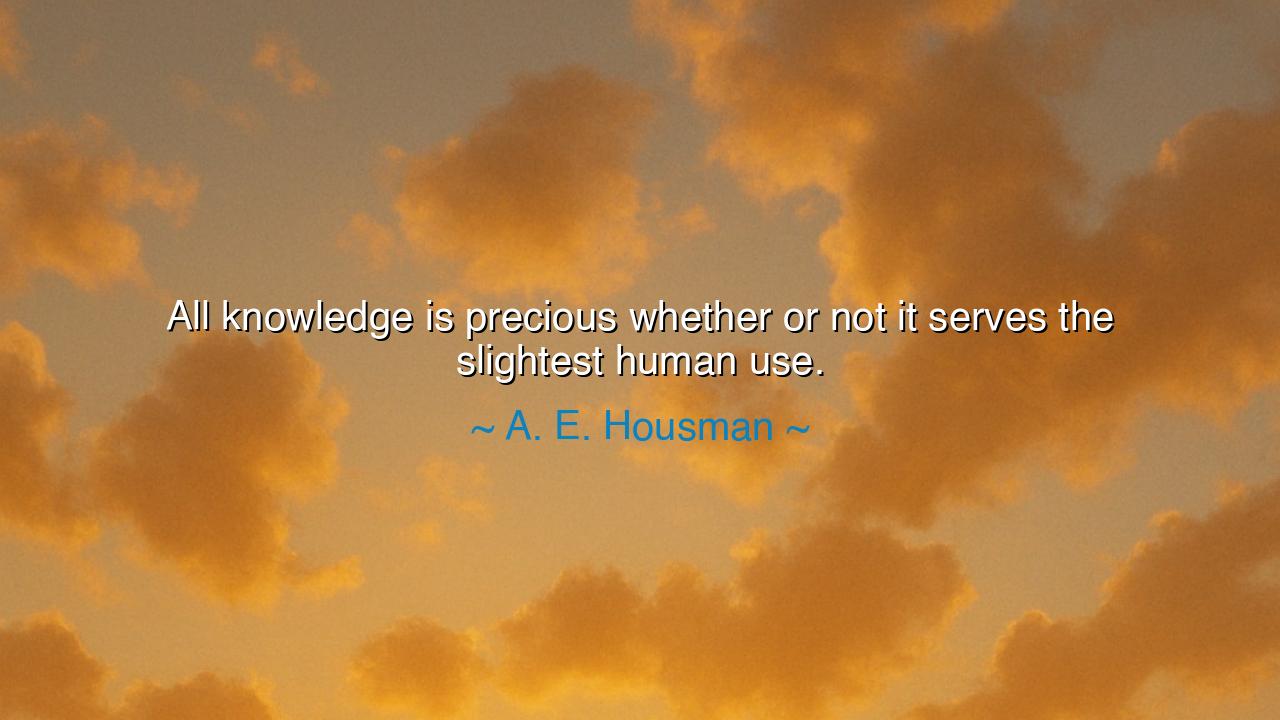
All knowledge is precious whether or not it serves the slightest






A. E. Housman, the poet and scholar, once spoke with a voice both tender and unyielding: “All knowledge is precious whether or not it serves the slightest human use.” These words stand as a challenge to the spirit of utility that dominates every age. For too often mankind weighs the value of a thing only by what profit it may bring, by what task it may accomplish, by what burden it may lift. Yet Housman reminds us that truth and understanding are treasures in themselves, worthy not because they serve us, but because they exist—because they deepen the mystery, because they reveal the infinite.
The meaning of this wisdom is profound. Knowledge need not always be bent toward invention or industry; it need not justify itself by coins earned or machines built. The discovery of a distant star, the translation of an ancient poem, the charting of a forgotten language—these may serve no immediate use, yet they ennoble the spirit, enlarge the mind, and remind us that we are part of something vast and eternal. To reduce all knowing to mere utility is to cage the soul; to cherish knowledge for its own sake is to let the soul fly upward.
The origin of Housman’s thought is rooted in his life as a classicist. He devoted himself to the study of ancient texts—works that many in his own day considered obscure or impractical. But Housman understood that such labors, though they yielded no machines, preserved the voices of antiquity, the whispers of humanity’s earliest wisdom. His words defend the dignity of learning that exists beyond the marketplace, insisting that the worth of knowledge cannot be measured by the scales of usefulness alone.
History confirms his teaching. When Gregor Mendel studied peas in his monastery garden, his work seemed useless—simple experiments with plants, yielding charts and numbers of little consequence. Yet decades later, those seeds of knowledge became the foundation of modern genetics, transforming medicine and biology. What once seemed without use became indispensable. And even had it not borne fruit, the work was still precious, for it revealed the patterns written in creation itself.
There are other treasures of knowledge that bear no practical harvest yet remain priceless. The beauty of a Van Gogh painting, the structure of a Shakespearean sonnet, the understanding of how galaxies collide—these may not fill stomachs or build cities, but they feed the soul. They awaken awe, they ignite wonder, they remind us that life is not only survival but also meaning. Such knowledge is not a tool but a mirror, reflecting back to us the grandeur of existence.
The lesson is this: never despise knowledge because it seems impractical. What today appears without use may tomorrow change the world, and what never serves a single human task may still serve the soul. To pursue truth for its own sake is to honor the dignity of the human spirit, which longs not only to live but to understand. The wise do not ask always, “What can this do for me?” but also, “What truth does this reveal?”
So what must you do? Learn widely. Treasure even the obscure, the arcane, the seemingly impractical. Support the work of poets, historians, scientists, and dreamers who follow truth beyond profit. Let your mind wander beyond the urgent into the eternal. And when you encounter knowledge that has no use, pause and honor it still—for it is part of the great inheritance of mankind, a jewel in the treasury of the universe.
Thus, remember Housman’s words: “All knowledge is precious whether or not it serves the slightest human use.” Let them guide your steps. For the worth of knowing is not bound to its utility, but to its power to awaken awe, to stir the imagination, and to remind us that we live in a cosmos not only to labor, but also to wonder. And in that wonder, humanity finds its truest greatness.






AAdministratorAdministrator
Welcome, honored guests. Please leave a comment, we will respond soon